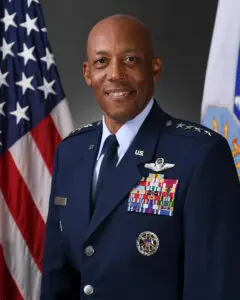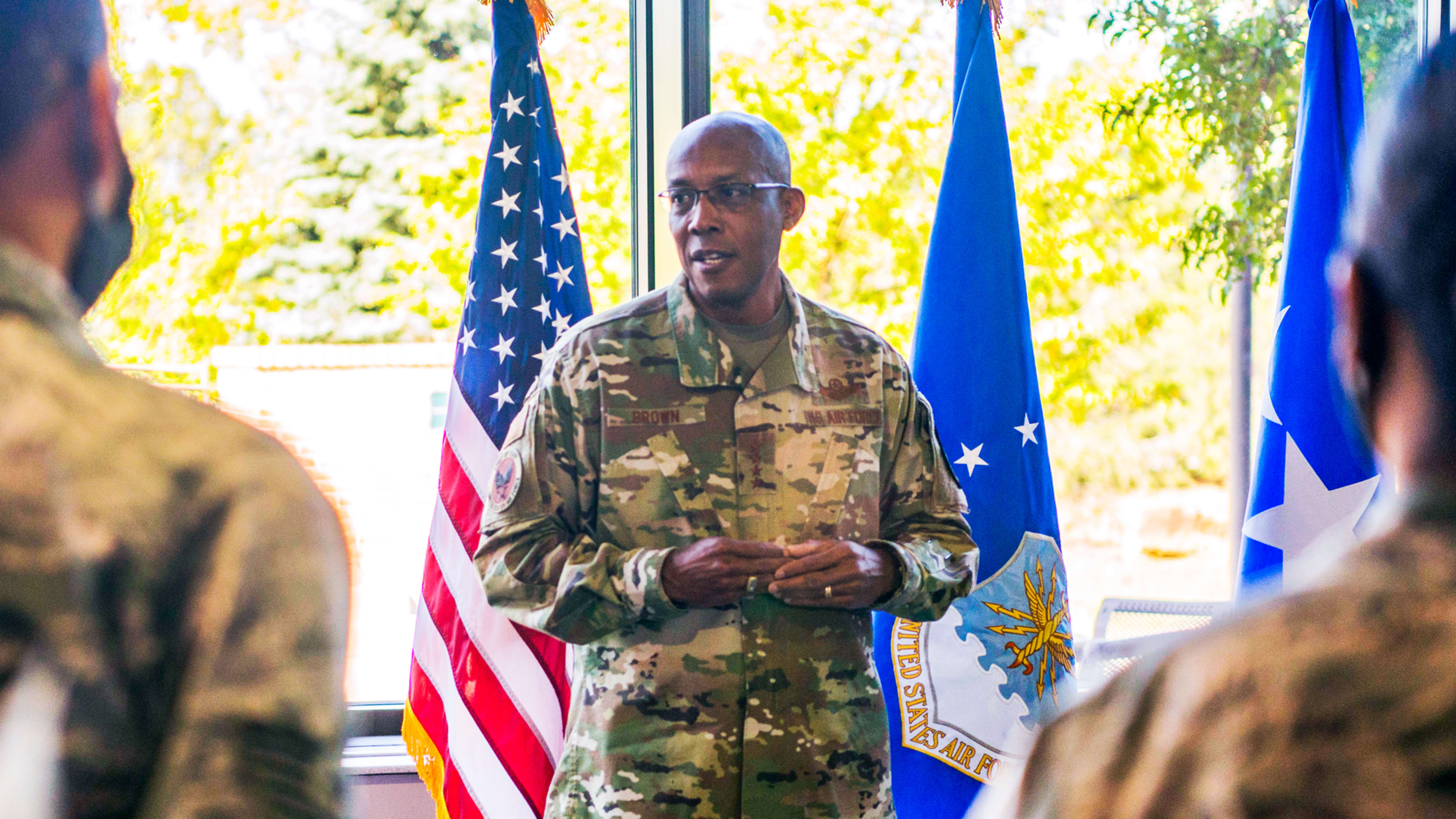General Charles Q. Brown Jr. became the first Black chief of staff of the Air Force during a perilous moment for the United States. In the time between Brown’s nomination and his unanimous confirmation by the Senate, George Floyd died under the knee of officer Derek Chauvin on the street in Minneapolis. While angry protests and a national reckoning over race unfolded around the country, Brown made the difficult decision to speak out with unusual frankness and depth of feeling for a military leader.
“I’m thinking about how my nomination provides some hope but also comes with a heavy burden,” he said in a video addressed to Air Force personnel. “I can’t fix centuries of racism in our country, nor can I fix decades of discrimination that may have impacted members of our Air Force.”

These new opponents may attack in ways that aren’t necessarily addressable using fighter planes and missiles. It’ll be Brown’s job to oversee the Air Force’s shift in investment away from legacy platforms and toward technologies that will allow the U.S. to compete in the battle theaters of the future.
I spoke to the general about these emerging threats, the Air Force’s work with U.S. tech startups to develop new defense systems, and his own evolving views on race and politics over a year that included the death of George Floyd and the January 6 attack on the U.S. Capitol.
The interview has been edited for length and clarity.
Fast Company: It’s been a year since the death of George Floyd, a year of reckoning with issues of racial justice and equity for companies and institutions. What can you say to young people, especially people of color, grappling with the present moment?
Brown: I’ve been thinking about [these issues] pretty much my entire Air Force career, based on experiences that I’ve had. But I think this past year has actually put it into sharp focus for me and many others. If you saw the video message that I released, that was inspired by my sons, and the conversations we had. And that message was developed growing up in my career. It’s just that there’s a lot of things you think about, and you keep it internal, or maybe you share it with a small group. Now, with what’s happened over the past year, for a lot of folks, what they share in a small group is much more open and transparent, and I think that’s actually created some much-needed dialogue on where we go as a nation.
For me personally, one reason I’ve stuck around [in the military] is that I know there’s a number of younger people that are watching, and I’ve always believed that you only aspire to be what you can see. If you’ve never seen [someone like you in that role], you’re never going to go, “I want to go out and be one of those.” That’s one of the reasons I continue to serve. That, and also I want to make a difference, and so I realize that I’ve got a lot of folks cheering me on—a lot of folks I don’t even know. It happens when I go out and travel places and people come up and talk to me. So it’s very important for me continuing to be who I am and being a role model for those who come behind.
The Air Force recently unveiled AFVentures, an investment arm of the AFWERX innovation lab, that works with tech startups with defense applications. How do you think about those partnerships as contributing to the larger mission of the Air Force?
When we look at technology and where a lot of the research and development goes, it used to be the Department of Defense that led the way. I think the tech sector now leads in a number of different areas where the Department of Defense is not as advanced. Part of what AFWERX and Air Force Ventures does is build that network and collaboration between those that actually have a lot of background and R&D in those areas. It’s all about our national security. The tech sector wants to make money. We want to protect the nation, and we’ve got to be able to do that together.
The Air Force has a culture of developing requirements that became very specific for the Department of Defense. Which means we’ll get a one-of-a-kind, versus kind of stepping back and going, “Okay, here’s the problem I’m trying to solve—who has some capability that we can adapt to the problem I’m solving?”
We can learn from the tech sector because it’s done some things that either we haven’t or vice versa. We want to be able to work with some of these nontraditional companies, and one way to do that is to open ourselves up and be more inviting and help coach them through the process. We’re a creature of habit, and so part of it is we get to break some habits.
The Air Force recently tested an artificial intelligence copilot on a U-2 spy plane, and DARPA oversaw a virtual dogfight pitting an AI against a human F-16 pilot (the computer won). What are your thoughts about the role of AI in the future of war?
I think artificial intelligence will play a role in the future because it will help us make decisions faster. But there’s a handful of things that you think about in order to have a valid AI capability. You’ve got to have data. It’s garbage in, garbage out, so if we don’t have the right data to help support our AI it will be unfocused and it will lead us down the wrong path.
What we don’t want, obviously, is 2001: A Space Odyssey, with Hal taking over. You don’t want an AI to give you an answer and then be part of a kinetic kill chain where you’re doing things that may cross an ethical line. I think AI should be used to provide options, and you still have a human manager in the loop who has a way to either validate it before things happen or stop things before it goes too far.
I think that’s an area that we’ve got to think through as we use more and more AI, particularly in military applications. Because right now there’s not a full body of work on ethical standards for AI. And the other part of that is our adversaries are using AI, and they might not have the same ethics we do.
The Chinese government can access and control intellectual property that’s developed by domestic companies. Does the U.S. government, and more specifically the Department of Defense, need greater access to private sector IP?
I don’t know that it’s about owning the IP. When I look at China and I look at the United States, we’re innovators. The Chinese are more copiers, so they’ll take something that got started by someone else. And we get concerned about intellectual property theft.
But for the Air Force we don’t necessarily want a company’s IP. You can still have your IP that makes you competitive. That helps us in the long run. We’ve just got to be open enough so we can all connect and work together and have the interface between various vendors.
On January 6 we witnessed an insurrection at the Capitol that included domestic extremist groups trying to prevent a peaceful transition of power. What was your reaction as you watched it play out?
I was home teleworking that day, so I was probably looking at my computer and sitting in front of the TV at the same time. Yes, it hurt. You’re thinking about the oath you took as an officer of the United States Air Force—supporting and defending the Constitution of the United States against all enemies, foreign and domestic. And you never really think domestic. We typically think about threats from abroad.
It really does make you think about how divided we’ve become across our nation. I’m about collaboration. I want to hear varying opinions. It was probably a wake-up call for many of us that we are divided in certain areas. But it’s actually gone to a different level, more so than many of us might have imagined, myself included. I hope and pray that wake-up call will change how we look at things going into the future as a nation. In our democracy we have the freedom of speech and the ability to be able to communicate and have a difference in opinion, versus an authoritarian government. But I also think there’s probably a set of limits where some things [are] a little bit over the line. And what we saw on the 6th was a little bit over the line in my opinion.
You work in a very top-down, chain-of-command environment. But you’re also known as a four-star general for having a more collaborative leadership style. What can you tell me about that?
I’m starting to smile because you talked about the chain of command. I told my wife this: I’ve never given a direct order. I mean, it only happens in World War II movies. Because, if you do that, you’ve got to get folks to buy into what you’re doing. And I think one way to do that as a leader is to be able to open yourself up . . . show vulnerability that I too have made mistakes. Because I’m here doesn’t mean I’ve made zero mistakes.
At the same time, making yourself available [is important] so that you can engage with those at the lower levels that are doing the job. The challenge I have is there’s a lot of stuff that, by the time it gets to me, gets so filtered. One of the things I periodically do is brown-bag lunches for different parts of the staff just to hear from them at the lower levels. When I travel to every base, I try to have either a breakfast or lunch with a group of junior airmen without their leader. I don’t want the leadership in the middle. Because if the leadership is there, then what happens? It all gets filtered because [the airmen] are afraid. I tell them I’m taking notes but I’m not taking names.
I have this mantra: I want to have the meeting after the meeting in the meeting. And so I encourage dialogue, and I try to pull that out of folks. It makes them feel more comfortable to open up and say what they really think. How many times have you been in a meeting where as soon as it’s over, and no one’s said anything, you get out in the hallway and then everybody’s got an opinion? I don’t want you to come back one at a time attacking me because you have an opinion. You say it in front of everybody. I just had a conference a couple of weeks ago with my three- and four-star generals, and I encouraged them to do that, and we actually did it. It’s actually pretty cool because iron sharpens iron, and I think that friction in the dialogue is very helpful.
Recognize your brand’s excellence by applying to this year’s Brands That Matter Awards before the early-rate deadline, May 3.
